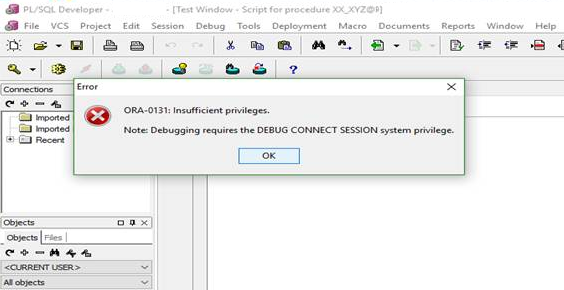Query # 1 :
desc v$license
Name Null? Type
----------------------------------------- -------- ----------------
SESSIONS_MAX NUMBER
SESSIONS_WARNING NUMBER
SESSIONS_CURRENT NUMBER
SESSIONS_HIGHWATER NUMBER
USERS_MAX NUMBER
CPU_COUNT_CURRENT NUMBER
CPU_CORE_COUNT_CURRENT NUMBER
CPU_SOCKET_COUNT_CURRENT NUMBER
CPU_COUNT_HIGHWATER NUMBER
CPU_CORE_COUNT_HIGHWATER NUMBER
CPU_SOCKET_COUNT_HIGHWATER NUMBER
Query # 2 :
select sessions_current from v$license;
Query # 3 :
select SESSIONS_CURRENT,SESSIONS_HIGHWATER,CPU_COUNT_CURRENT,CPU_COUNT_HIGHWATER from v$license;
Query # 4 :
SELECT USERNAME FROM DBA_USERS
Query # 5 :
SELECT distinct user_id from FND_LOGINS
Query # 6 :
SELECT distinct user_id from icx_sessions
Query # 7 :
SELECT distinct user_id from FND_USER
Query #8:
select application_name,responsibility_name,
security_group_name, user_name,
greatest(u.start_date, ur.start_date, r.start_date) start_date,
least(nvl(u.end_date, nvl(ur.end_date, r.end_date)),
nvl(ur.end_date, nvl(u.end_date, r.end_date)),
nvl(r.end_date, nvl(u.end_date, ur.end_date))) end_date
from fnd_user u,fnd_user_resp_groups ur,
fnd_responsibility_vl r,fnd_application_vl a,
fnd_security_groups_vl s
where a.application_id = r.application_id
and u.user_id = ur.user_id
and r.application_id = ur.responsibility_application_id
and r.responsibility_id = ur.responsibility_id
and ur.start_date sysdate
and u.start_date sysdate
and r.start_date sysdate
and ur.security_group_id = s.security_group_id
order by application_name,responsibility_name,security_group_name, user_name
Query # 9 :
select application_name,responsibility_name,
security_group_name, user_name,
greatest(u.start_date, ur.start_date, r.start_date) start_date,
least(nvl(u.end_date, nvl(ur.end_date, r.end_date)),
nvl(ur.end_date, nvl(u.end_date, r.end_date)),
nvl(r.end_date, nvl(u.end_date, ur.end_date))) end_date
from fnd_user u,fnd_user_resp_groups ur,
fnd_responsibility_vl r,fnd_application_vl a,
fnd_security_groups_vl s
where a.application_id = r.application_id
and u.user_id = ur.user_id
and r.application_id = ur.responsibility_application_id
and r.responsibility_id = ur.responsibility_id
and ur.start_date sysdate
and u.start_date sysdate
and r.start_date sysdate
and ur.security_group_id = s.security_group_id
order by application_name,responsibility_name,security_group_name, user_name




